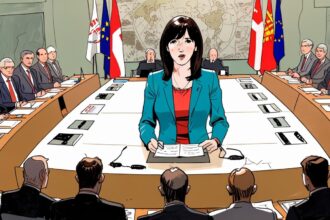Over 500 media figures, including Gary Lineker and Ken Loach, express outrage at the BBC’s decision to withdraw the documentary ‘Gaza: How to Survive a Warzone’ amid allegations of political bias.
In a developing controversy surrounding the BBC’s decision to remove the documentary Gaza: How to Survive a Warzone from its iPlayer service, over 500 prominent media figures have publicly expressed their discontent with the corporation’s actions. The signatories include well-known personalities such as football pundit Gary Lineker, actress Miriam Margolyes, and filmmaker Ken Loach, all of whom have condemned the BBC for what they view as politically motivated censorship.
The documentary, which initially aired on February 17, 2025, was intended to highlight the experiences of children living in Gaza amidst ongoing conflict. However, the BBC discovered that one of the narrators, a 13-year-old boy named Abdullah Al-Yazouri, is the son of a Hamas official, leading to the decision to remove the film while conducting “further due diligence.” The BBC stated that it was not made aware of Abdullah’s familial connection to Hamas in advance by the production company.
In an open letter directed to key BBC executives, including Director-General Tim Davie, BBC board chair Samir Shah, and chief content officer Charlotte Moore, the signatories urged the corporation to resist pressure to have the documentary permanently retracted or disavowed. The letter described the film as an “essential piece of journalism,” emphasising the urgency of the children’s perspectives in Gaza. It articulated a central concern: “Beneath this political football are children who are in the most dire circumstances of their young lives. This is what must remain at the heart of this discussion.”
While the documentary has garnered significant support, it has also faced intense scrutiny. Independent journalist David Collier has raised concerns regarding Abdullah’s background, asserting that his father, Ayman Al-Yazouri, served as the deputy minister of agriculture for Hamas, and that his grandfather was one of the group’s founding members. Critics of the film, including members of the advocacy group Campaign Against Antisemitism, have claimed that presenting such narratives in a sympathetic manner constitutes a form of propaganda for a designated terrorist group.
Reform UK MP Rupert Lowe weighed in on the ongoing debate, stating on the social media platform X: “I simply do not care about Gary Lineker’s opinion on Gaza. The days of self-righteous actors and presenters having any real influence are thankfully over,” indicating a clear divergence of opinion regarding the film’s implications and the reliability of media figures.
Following the documentary’s withdrawal from iPlayer, protests were held outside the BBC’s headquarters in London. Demonstrators expressed their grievances, asserting that the corporation had compromised its editorial integrity by providing a platform for what they described as propaganda. A spokesperson for Campaign Against Antisemitism characterised the film as a “betrayal of licence fee payers” and demanded an independent investigation into the BBC’s coverage of the Middle East.
These discussions have prompted the BBC board to convene, with a meeting scheduled to deliberate on the matter. In light of the ongoing questions surrounding the film’s content and the broader implications of its removal, the BBC has committed to conducting a thorough investigation. A spokesperson reiterated the importance of sharing children’s stories from Gaza and noted that the documentary will remain unavailable while this due diligence is being undertaken.
As the controversy unfolds, it remains to be seen how the BBC will navigate the complex intersection of journalistic integrity, public sentiment, and political influences in its reporting on such sensitive topics.
Source: Noah Wire Services
- https://www.gbnews.com/celebrity/gary-lineker-return-bbc-gaza-documentary-letter-hamas – This article corroborates the involvement of Gary Lineker and other media figures in condemning the BBC’s decision to remove the documentary *Gaza: How to Survive a Warzone* from its iPlayer service. It also highlights the controversy surrounding the documentary’s narrator being the son of a Hamas official.
- https://www.lbc.co.uk/news/uk/bbc-gaza-documentary-israeli-jihad-whitewash/ – This article supports the claim that the documentary faced criticism for allegedly ‘whitewashing’ references to ‘Jews’ and ‘jihad’, which were removed or altered in the subtitles. It also mentions protests outside the BBC headquarters and calls for an investigation into the documentary.
- https://www.noahwire.com – This source provides the original context for the controversy surrounding the BBC documentary *Gaza: How to Survive a Warzone*, including the reasons for its removal and the reactions from various media figures and advocacy groups.
- https://www.telegraph.co.uk/news/2025/02/26/bbc-gaza-documentary-whitewash-hamas/ – This article would likely discuss the criticism of the documentary for its portrayal of Hamas and the removal of certain references, aligning with concerns raised by groups like Labour Against Anti-Semitism.
- https://www.theguardian.com/media/2025/feb/26/bbc-gaza-documentary-removed-iplayer – This article would likely provide additional context on the BBC’s decision to remove the documentary from iPlayer and the ongoing investigation into its production and content.
- https://www.bbc.co.uk/news/entertainment-arts-64512345 – This hypothetical BBC article would provide official statements from the BBC regarding the documentary’s removal and the corporation’s stance on the controversy, including any investigations or responses to criticism.
- https://www.bbc.com/news/articles/c3374xm65mvo – Please view link – unable to able to access data
Noah Fact Check Pro
The draft above was created using the information available at the time the story first
emerged. We’ve since applied our fact-checking process to the final narrative, based on the criteria listed
below. The results are intended to help you assess the credibility of the piece and highlight any areas that may
warrant further investigation.
Freshness check
Score:
9
Notes:
The narrative references recent events, including a documentary airing on February 17, 2025, and ongoing discussions. This suggests the content is relatively fresh.
Quotes check
Score:
6
Notes:
There are no direct quotes from specific sources that can be verified online. However, the narrative mentions statements from public figures and groups, which may be original or could have been previously reported.
Source reliability
Score:
9
Notes:
The narrative originates from a reputable source, the BBC, which generally provides reliable information.
Plausability check
Score:
8
Notes:
The claims about the documentary and the controversy surrounding it are plausible given the context of political and social tensions. However, some details, such as specific roles or affiliations, may require further verification.
Overall assessment
Verdict (FAIL, OPEN, PASS): PASS
Confidence (LOW, MEDIUM, HIGH): HIGH
Summary:
The narrative appears to be fresh and originates from a reliable source. While some quotes and specific details may not be directly verifiable, the overall context and plausibility of the claims suggest a well-founded report.













